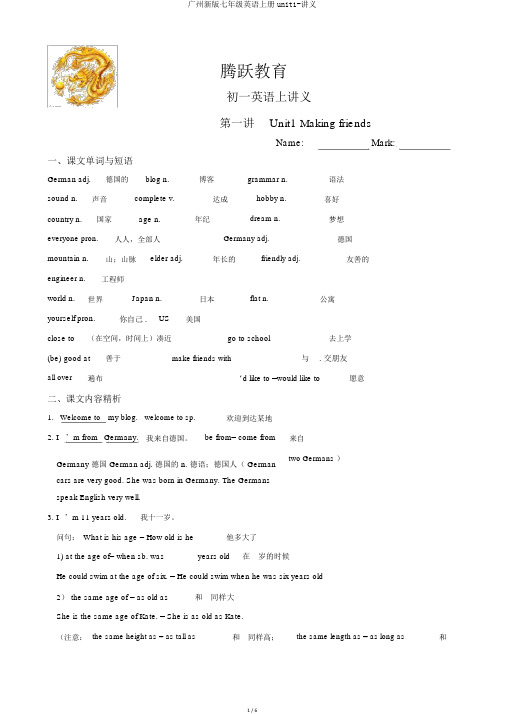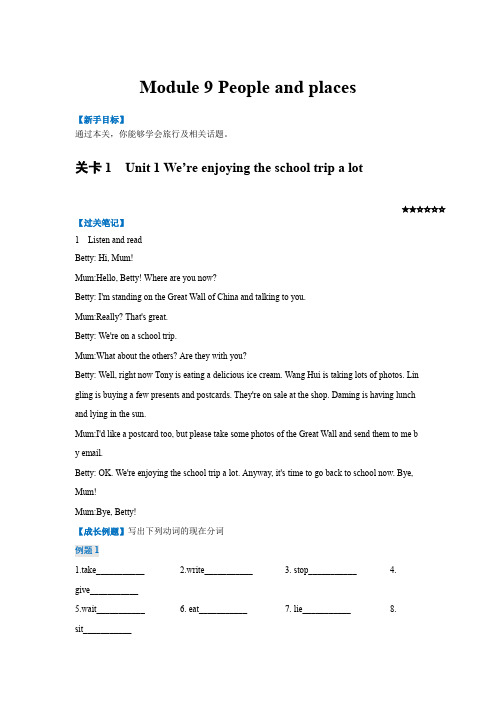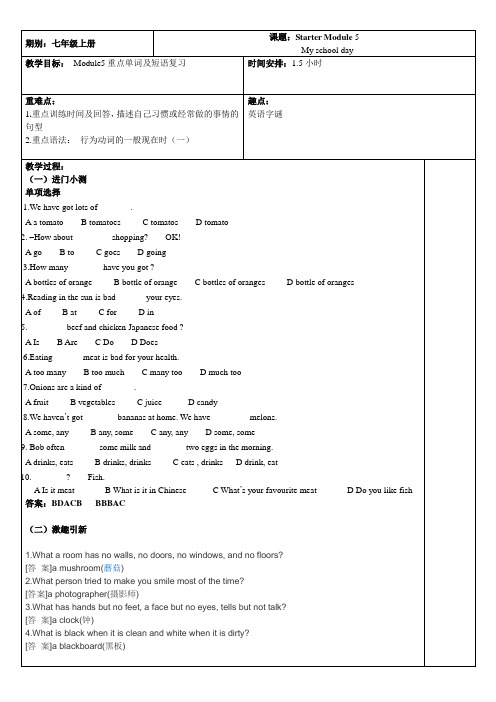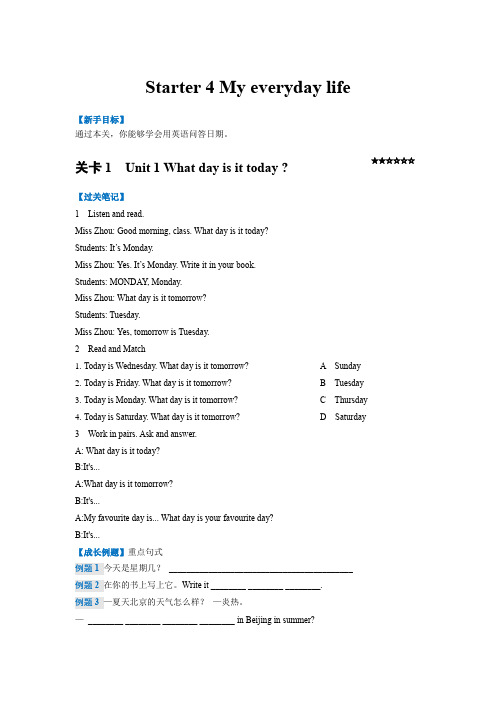七年级上册英语讲义
人教版七年级上册英语讲义 Unit 6 Do you like bananas

Unit 6 Do you like bananas? 讲义一、【重点单词】banana /bə'nɑ:nə/香蕉hamburger /'hæmbɜ:(r)ɡə(r)/汉堡包tomato /tə'mɑ:təʊ/西红柿ice-cream /,aɪs'kri:m/冰激凌salad /'sæləd/沙拉strawberry /'strɔ:berɪ/草莓pear /peə(r)/梨milk /mɪlk/牛奶bread /bred/面包birthday /'bɜ:(r)θdeɪ/生日dinner /'dɪnə(r)/(中午或晚上吃的)正餐week /wi:k/周;星期food /fu:d/食物sure /ʃʊə(r)/当然;肯定;一定burger /'bɜ:(r)ɡə(r)/汉堡包= hamburgervegetable /'veʤtəbəl/蔬菜fruit /fru:t/水果right /raɪt/正确的;适当的apple /'æpl/苹果then /ðen/那么egg /eɡ/蛋;鸡蛋carrot /'kærət/胡萝卜rice /raɪs/大米;米饭chicken /'ʧɪkɪn/ji鸡肉so /səʊ/ (引出评论或问题)那么breakfast /'brekfəst/早餐;早饭lunch /lʌnʧ/午餐star /stɑ:(r)/明星;星星eat /i:t/吃well /wel/好;令人满意的habit /'hæbɪt/习惯healthy /'helθi/健康的really /'ri:əli/真正地question /'kwesʧən/问题want /wɒnt/需要;想要be /bi:/变成fat /fæt/肥的;肥胖的二、【重点短语】1. John ’s birthday dinner 约翰的生日宴会2. vegetable salad 蔬菜沙拉3. two tomatoes 两个西红柿4. eat well 吃得营养5. think about 考虑6. eat/have breakfast/lunch/dinner 吃早/午/晚饭7. sports stars 体育明星8. the volleyball star 排球明星9. ask sb. about sth. 问某人某事10. like hamburgers/ice-cream 喜欢汉堡包/冰淇淋11. like eating eggs 喜欢吃鸡蛋12. her eating habits 她的饮食习惯13. be (not) healthy (不)健康14. one last question 最后一个问题15. healthy food 健康食物16. after breakfast/lunch/dinner 早/午/晚饭后17.one last question 最后一个问题18.some fruit 一些水果19.for dinner 作为晚餐20.how about 怎么样三、【重点句型】1.—Do you like salad? 你喜欢沙拉吗?一Yes,I do. /No, I don’t. 是的,我喜欢。
广州新版七年级英语上册unit1-讲义

腾跃教育初一英语上讲义第一讲Unit1 Making friendsName:Mark:一、课文单词与短语German adj. 德国的blog n. 博客grammar n. 语法sound n. 声音complete v. 达成hobby n. 喜好country n. 国家age n. 年纪dream n. 梦想everyone pron. 人人,全部人Germany adj. 德国mountain n. 山;山脉elder adj. 年长的friendly adj. 友善的engineer n. 工程师world n. 世界Japan n. 日本flat n. 公寓yourself pron. 你自己 . US 美国close to (在空间,时间上)凑近go to school 去上学(be) good at 善于make friends with 与 . 交朋友all over 遍布‘d like to =would like to 愿意二、课文内容精析1.Welcome to my blog. welcome to sp. 欢迎到达某地2. I ’m from Germany. 我来自德国。
be from= come from 来自two Germans )Germany 德国 German adj. 德国的 n. 德语;德国人( Germancars are very good. She was born in Germany. The Germansspeak English very well.3. I ’m 11 years old. 我十一岁。
问句:What is his age = How old is he 他多大了1) at the age of= when sb. was years old在岁的时候He could swim at the age of six. = He could swim when he was six years old2) the same age of = as old as和同样大She is the same age of Kate. = She is as old as Kate.(注意:the same height as = as tall as 和同样高;the same length as = as long as 和同样长)4. I have long hair.我有长头发。
外研版-七年级上册讲义-学生版-Module9

Module 9 People and places【新手目标】通过本关,你能够学会旅行及相关话题。
关卡1 Unit 1 We’re enjoying the school trip a lot★★☆☆☆☆【过关笔记】1 Listen and readBetty:Hi,Mum!Mum:Hello,Betty!Where are you now?Betty:I'm standing on the Great Wall of China and talking to you.Mum:Really?That's great.Betty:We're on a school trip.Mum:What about the others?Are they with you?Betty:Well,right now Tony is eating a delicious ice cream.Wang Hui is taking lots of photos.Lingling is buying a few presents and postcards.They're on sale at the shop.Daming is having lunchand lying in the sun.Mum:I'd like a postcard too,but please take some photos of the Great Wall and send them to me by email.Betty:OK.We're enjoying the school trip a lot.Anyway,it's time to go back to school now.Bye,Mum!Mum:Bye,Betty!【成长例题】写出下列动词的现在分词例题11.take___________2.write___________3. stop___________4.give___________5.wait___________6. eat___________7. lie___________8.sit___________9. drive___________ 10. say___________ 11.shop___________ 12.run___________【成长例题】用所给词的适当形式填空例题1 Look! They ____________ (shop) over there.例题2 Tom ____________ (have) a big family.例题3 Can you ____________ (send) the postcard to me?例题4 They often ____________ (do) their homework on Saturday afternoon.例题5 What is Tony ____________ (do)?He ____________ (eat) an ice cream.【过关练习】根据句意及汉语完成句子练习1 Betty is ______________________(站在长城上).练习2 Is Wan Hui ______________________(拍照)now?练习3 Daming is ______________________(吃午餐)and ______________________(躺在阳光下).练习4 They are ______________________(玩得愉快).练习5 We are ______________________(学校郊游).★★☆☆☆☆关卡2 Unit 2 They're waiting for buses or trains.1 Read the passageAt this moment,in different places of the world,people are doing different things.A In London,it's five o'clock in the afternoon and people are leaving work and are going home.They'rewaiting for buses or trains.Some people are driving home.Some are getting off buses or trains.Some arehaving afternoon tea at home or having a drink.B In Moscow,it's eight o'clock in the evening,so people aren't having afternoon tea.They are havingdinner at home or in restaurants.Some are going to the theatre or watching a film.Some are watchingtelevision or playing games at home.C In Beijing,it's one o'clock at night,so people aren't having dinner.Most people are sleeping. Somepeople are still working and some are going home from work.D In Los Angeles,it's nine o'clock in the morning.People aren't sleeping.They're working.Chil dren arestarting their lessons.E In New York,it's twelve o'clock.People aren't working.They're having lunch.They are eatinghamburgers or hot dogs and drinking coffee or cola.Some people are seeing friends,calling home or shopping.【成长例题】句型转换例题1 The families are having dinner on Christmas Eve.(改为一般疑问句)__________ the families __________ dinner on Christmas Eve?例题2 She plays pingpong in the morning.(用now 替换画线部分改写句子)She __________ __________ pingpong now.例题3 Is Kate eating lunch at school?(作肯定回答)__________, __________ __________.例题4 The students are having an English class.(改为否定句)The students __________ __________ an English class.例题5 I am reading.(对画线部分提问)__________ __________ you __________ ?【成长例题】用所给单词的适当形式填空例题1 Look! Tony and David __________ (swim) over there.例题2 Linda __________ (go) on the Internet now.例题3 Alice __________ (watch) a movie at the moment.根据要求改写句子例题4 They are having history.(改为否定句)They __________ __________ history.例题5 Jenny is watching the animals in the zoo.(改为一般疑问句)__________ Jenny __________ the animals in the zoo?【过关练习】翻译下列句子练习1别在课堂上讲话,我正在给你们讲故事。
Module5讲义七年级英语上册

(三)新课讲授
规则:老师说出模块重点单词的中文,学生分成两队轮流回答相应中文对应的英文单词(拼写);回答正确可得2分,回答错误则答题权归对手,对手回答正确分数翻倍,可得4分,回答错误,不加分不扣分。
1一半half
2晚于,过几点past
3地理geography
4历史history
5信息技术IT
6数学maths
7科目subject
8因为because
9有趣的interesting
10工作日weekday
11困难的,难懂的difficult
12学习,工作work
13休息break
14在星期五下午on the Friday afternoon
15最喜爱的科目favourite subject
16和某人谈话talk with sb.
17擅长……be good at
18对某人来说困难be difficult for sb
19在工作日on weekdays
20休息have a break
21开始工作start to work
第二环节:知识点梳理
(1)时间表达法
ten ten(或者ten past ten)seven fortyfive(或者fifteen to eight)
注意:≤半小时,分钟past 点钟
≥半小时,分钟to 下一点钟
Ⅰ. 写出下列时间的表达法
1) 7:00 ____seven o’clock
2) 9:30 __half past nine__
3) 6:20 _twenty past six_/six twenty_
4) 11:10 _ten past eleven_/eleven ten_。
Unit5讲义人教版英语七年级上册

U5 Do you have a soccer ball必会内容:1学会一些运动项目的名词:soccer ball, tennis, pingpong ball, volleyball等2.掌握句型:“Do you have …? Does he/she have…?3.学会用have对物品的所属进行提问与问答。
4.学会使用描述形容词对事物做出。
5.学会句型“let’s“提建议并在情景中运用。
一.单项选择。
一、单项选择。
( ) 1. The English song ______very nice. Can you guess who is singing?A. smellsB. tastesC. soundsD. feels( ) 2. Let’s ______this song together.A. singsB. singC. singingD. to sing( ) 3. ______ you have a new basketball?A. IsB. AreC. DoD. Does( ) 4. –Let’s play pingpong!–Good idea, ______ I don’t have a bat.A. soB. orC. andD. but( ) 5. Let______ have a look at your sweater.A. myB. meC. ID. mine( ) 6. I only ______that famous star ______TV.A. watch, onB. watch, inC. see, atD. see, in( ) 7. –Do you know his name?–No, I ________.A. am notB. don’tC. can’tD. do ( ) 8. Zhang Wei ______an English dictionary.A. doesn’t hasB. haveC. doesn’t haveD. don’t have( ) 9. –Can you go to the movies ______ me?–Sure. Let’s go.A. withB. forC. toD. on( ) 10. –Do you have a puter game?–_____.A. Yes, it is.B. Yes, I have.C. No, I haven’tD. Yes, I do( ) 11. –Let’s _____pingpong ball. It’s time to have class.–All right.A. aren’t playB.doesn’t playC. don’t playD. not play( ) 12. –Does Anna have a pencil case?–______.A. No, she doesn’tB. Yes, she doC. No, she doD. Yes, she doesn’t( ) 13. –Let’s go to play football.–______.A. Not at allB. Thank youC. That sounds goodD. Good luck( ) 14. –Does your brother have a soccer?–Yes, but he doesn’t play sports. He only______ them on TV.A. watchB. watchesC. look atD. looks( ) 15. –Can Sally play_____ basketball?–No, she can’t.A. theB. aC. anD. /二、用方框中所给词的适当形式填空。
人教版新目标七年级英语上册Unit 7讲义及重点总结

新目标七年级上册Unit7讲义Unit7目标:1.会问价格;2. 谈论衣物;3. 提供帮助; 4. 感谢某人四、词汇讲解及拓展1. 成双成对的词【☆☆】由两部分组成的物品常以复数的形式出现,如:socks,shoes,trousers ,clothes (1)这些物品作主语时,谓语动词一般用复数形式:How much are the socks? 袜子多少钱?(2)若要表示一双,一副,一条”时,可用a pair of , 这时谓语动词用单数。
This pair of socks is $18.【例题】1. Bob’s ______ and ______ are on the sofa.A. trouser; shortB. trousers; shortC. trousers; shortsD.trouser; shorts2. This pair of shorts ______ Eric’s.A. amB. isC. areD.be2. How much is this T-shirt? 这件T恤多少钱?【☆☆☆】How much 用来询问价格,意为:“多少钱”结构:How much is + 单数可数名词/ 不可数名词? 回答:It’s + 价格.How much are + 可数名词复数? 回答:They are + 价格.E.g. ---- How much is this sweater? ---- It’s twenty-one dollars. 这件毛衣多少钱?它21美元。
----How much the shoes? ---- They are twenty-five dollars. 这双鞋多少钱?它们25美元。
【例题】1. —How much is your skirt? —______ 50 yuan.A. I’mB. You’reC. They’reD. It’s2. 这个书包多少钱?它9美元。
外研版-七年级上册讲义-教师版-Starter4

Starter 4 My everyday life【新手目标】通过本关,你能够学会用英语问答日期。
★★☆☆☆☆关卡1 Unit 1 What day is it today ?【过关笔记】1 Listen and read.Miss Zhou: Good morning, class. What day is it today?Students: It’s Monday.Miss Zhou: Yes. It’s Monday. Write it in your book.Students: MONDAY, Monday.Miss Zhou: What day is it tomorrow?Students: Tuesday.Miss Zhou: Yes, tomorrow is Tuesday.2 Read and Match1.Today is Wednesday. What day is it tomorrow? A Sunday2.Today is Friday. What day is it tomorrow? B Tuesday3.Today is Monday. What day is it tomorrow? C Thursday4.Today is Saturday. What day is it tomorrow? D Saturday3 Work in pairs. Ask and answer.A: What day is it today?B:It's...A:What day is it tomorrow?B:It's...A:My favourite day is... What day is your favourite day?B:It's...【成长例题】重点句式例题1 今天是星期几?__________________________________________例题2 在你的书上写上它。
人教版(2024)七年级英语上册 Starter Unit 1-3 讲义

starter unit 1 Hello重点知识点梳理1· Good morning, class. 早上好!同学们Good morning, Ms Gao. 早上好!Ms Gao.小夫子提醒:问候是相互的,所以当别人向你问候的时候,也请问候对方。
2· Can you say hi to the class? 你可以向同学们问声好吗?小夫子提醒:①句型来一个:Can you + 动词原形?意为“你可以做……吗?”eg: Can you help me? 你可以帮助我吗?②搭配来一个:say hi/ hello to sb. 意为“向某人问好”eg: Please say hello to your grandma for me? 请代我向你奶奶问好。
3· Nice to meet you, Emma. 见到你很高兴,艾玛。
小夫子提醒:别人说“见到你很高兴”,你是不是也应该表示一下呢?Nice to meet you too(也) 你值得拥有。
还可以用good,great来替换nice。
eg: ---- Nice to meet you, Emma. 很高兴见到你,艾玛。
---- Nice to meet you too, Fu Xing! 见到你也很高兴,付星。
4· So what’s your name? 那么你的名字是什么?小夫子提醒:问对方姓名的常用句型:what’s your name? 你的名字是什么?该句型也可换成:May I have/ know your name?答语:I’m + 名字= My name is + 名字eg: ---- What’s your name?( =May I have your name?)---- I’m Fu Xing(= My name is Fu Xing)5· How do you spell your name? 你怎么拼写你的名字?小夫子提醒:how do you spell …?想询问怎么拼写名字或者某个名词时常用句型。
- 1、下载文档前请自行甄别文档内容的完整性,平台不提供额外的编辑、内容补充、找答案等附加服务。
- 2、"仅部分预览"的文档,不可在线预览部分如存在完整性等问题,可反馈申请退款(可完整预览的文档不适用该条件!)。
- 3、如文档侵犯您的权益,请联系客服反馈,我们会尽快为您处理(人工客服工作时间:9:00-18:30)。
七年级英语(上册)材料三个预备单元●一、文化常识英语文化区域,熟人之间见面,常要互相问好。
早上用语Good morning !下午用语Good afternoon ! 晚上用语Good evening ! 例如:(1) Bob: Good morning , Helen !Helen : Good morning , Bob !Bob : Good afternoon , Helen !Helen : Good afternoon , Bob ! ( 注意句子标点)Bob : Good evening , Helen !Helen : Good evening , Bob !2、在轻松场合中,人们常用Hello 或者Hi打招呼,但就是两人用语要一致,不能一个人用Hello,另一个人用Hi。
例如:(1)Helen : Hi , Bob ! Bob : Hi , Helen !(2)Helen : Hello , Bob ! Bob : Hello , Helen !●二、几个功能句型问答“身体健康”用语1、Bob : Hi , Helen ! How are you ? 喂,海伦!您好吗?Helen : Hi , Bob ! I’m fine , thanks 、How are you ?= I’m OK ↘对方关心您得健康,↘您也要询问对方得健康。
可= I’m well 一定要向对方说谢谢。
以用简略语言:And you ?Bob : I’m fine , too 、我也很好。
2、问一个东西“英语名字”得常用句型Helen : What’s this / that in English ? 这个用英语怎么说?↘(答句中,一定用it 代替this / that)Bob : It’s a / an + 英语名称。
( key jachet quilt orange ruler pen )Helen : Spell it , please 、( = How do you spell it ? ) 请拼写它。
(= 您怎样拼写它?) Bob : K- E-Y 、(拼写单词,用大写字母,并且字母与字母之间用连字符连接) 3、问一个东西颜色得常用句型:Helen : What color is it ?Bob : It is + 颜色。
●三、1、不定词a与an得区别a 用在辅音开头得单词前,an 用在元音开头得单词前。
例如a pen 一支钢笔; an apple 一个苹果a book 一本书an hour 一小时a “u”一个字母“u”an orange 一个橙子;;●2、指示代词this 与that 得区别this 指代近处得人或物,that 指代远处得人或物。
●本块习题:●1、写出同义词或同义句●Hello !_________ I’m fine 、__________ Thanks 、_________●Spell it , please 、_______________________●2、写出下列词得缩略形式I am ______ what is ________ it is _________ ●3、补全对话●(1)、A: Hi , Helen ! How are you ?● B : _______ , Bob ! ______ ______ well , ______ ______ 、______●_______ ?●A: I’m ______ , _______ 、●(2) 、A: What’s this _______English ? B : _______ is ______ jacket 、●(3)、A : What ______ is it ? B : It______ green 、●4、改错(1)、---What is it ? ---It is an “u”、●(2)、---What’s that in English ? ---That is a quilt 、●(3)、---What’s this in English ? ---This is a key 、●(4 )、This is an ruler , that is a orange 、●Unit 1 My name’s Gina●一、what is , 缩略式what’s , 表示“就是什么”。
问“某人得名字就是什么”、“某人得姓●就是什么”、“某人得电话号码就是什么”,都用what is 。
●1、问某人得名字句型●问句: What’s your name ?答句: My name’s + 名字。
●his his●her her●2、问某人得姓句型●问句: What’s your family name ?答句: My family name’s + 名字。
●his = last name his●her her●3、问某人得姓得句型●问句: What’s your first name ?答句:My first name’s + 名字。
●his his●her her●4、问某人电话号码得句型●问句: What’s your telephone number ?答句:It is + 电话号码。
●his●her●5、Nice to meet you ! ( 见到您真高兴!) 就是“陌生人”见面客套用语。
对方答语只能就是Nice to meet you , too 、( 见到您也真高兴)●Nice to see you ! (见到您真高兴!) 就是“熟人”见面客套用语。
对方答语只能就是Nice to see you , too 、( 见到您也真高兴)●英语人名●(1)、英语人名由三部分组成:第一个名字+ 第二个名字+ 姓。
first name middle name family name = last name●(2)、英语人名最突出得特点就是:名在前,姓在后,第二个名字不常说。
例如:1 Gina Green 吉娜、格林first name family name = last name2、Jim Smithfirst name family name = last name●(3)、尊敬、客气地称呼一个人,常用方式就是:Mr 或Mrs 或Miss + 姓。
Gina Green 我们可以称呼为Miss Green 。
Jim Smith 可以称呼为Mr Green ●三、形容词性物主代词●表示“某人得”、修饰名词得代词叫形容词物主代词。
●主格人称代词I you he she it we you they●汉语我您她她它我们您们她们●形容词物主代词my your his her its our your their●汉语我得您得她得她得它得我们得您们得她们得●本块习题●1、name is (缩略式)_______ boy (对应词)_______last name (同义词)_______ telephone number (同义词)_______my (主格人称代词)_______ you (形容词性物主代词)_______●2、补全句子A:_________________ B: My name’s Mary 、A:What’s his name ? B: _____________Jim 、A:_________________? B: My telephone number is 3968、●3、根据括号中得答案,用完整句子回答问题。
What’s your name ? ( Mary ) _______________________What’s his name ? ( Jim )_______________________What’s his last name ( Green )?_______________________What’s her phone number( 92931 ) ?_______________________●Unit 2 Is this your pencil ?●一、be 有三个形式:am is are。
am 就是be 单第一人称单数形式;is就是be 得第三人称单数形式;are就是be 得复数形式;be就是am is are得原型。
●二、Excuse me 、可以灵活翻译成“劳驾、打扰了”。
当要“与陌生人搭话”或者“将要做得事会打扰别人”时,使用该语言。
●三、含be得肯定句变否定句与一般疑问句得方法以及一般疑问句得●回答方法。
变否定句be + not (is not →isn’t are not →aren’t )含be 得肯定句变一般疑问句be 提到主语前(am →are I →you my →your )一般疑问句用Yes 或No 回答。
借用一般疑问句得第一个词,且主语得简略回答用主格人称代词。
●练习题(一)、把下列含be 得肯定句先变成否定句,再变成一般疑问句,●然后做一般疑问句。
肯定句否定句一般疑问句肯定回答否定回答●1、肯定句This is my pencil 、(这就是我得铅笔)否定句This ______my pencil 、(这不就是我得铅笔)一般疑问句______ this______ pencil ? (这就是您得铅笔吗)肯定回答____________、否定回答、_____________●2、肯定句That is my eraser 、(那就是我得橡皮擦)否定句That ______eraser 、(那不就是我得橡皮擦)一般疑问句______ that ______eraser ? (那就是您得橡皮擦)肯定回答____________ 否定回答______________●3、肯定句These are my pens 、(这些就是我得钢笔)否定句These______ my pens 、(这些不就是我得钢笔)一般疑问句______ these ______pens ? (这些就是您得钢笔吗)肯定回答____________、否定回答____________ 、●4、肯定句Those are his baseballs 、(那些就是她得棒球)否定句Those ______his baseballs 、(那些不就是她得棒球)一般疑问句______those ______ pens ? (那些就是她得棒球吗)肯定回答____________ 否定回答____________● 5 、肯定句I am Helen (我就是海伦)否定句______ ______Helen 、(我不就是海伦)一般疑问句______ ______Helen 、(您就是海伦吗)肯定回答____________、否定回答____________ 、● 6 、肯定句It is her notebook 、(它就是她得笔记本)否定句It ______her notebook 、(它不就是她得笔记本)一般疑问句______ ______ her notebook ? (它就是她得笔记本吗)肯定回答____________、否定回答____________ 、●7、肯定句A lot of keys are in the pencil—case 、(许多钥匙在铅笔合里)否定句A lot of keys ______in the pencil—case 、(许多钥匙不在铅笔盒里)一般疑问句______a lot of keys in the pencil—case ? (许多钥匙在铅笔盒里吗?)肯定回答____________、否定回答____________ 、●(二)、补全对话Jim: ______ ______ , Tom 、Is this your dictionary ?Tom: Yes,______ ______Jim :What’s this ?Tom: It’s _______ eraser 、Jim : How do you ______ it ?Tom : E—R—A—S—E—R●Unit 3 This is my sister●名词: 名词分为可数名词与不可数名词。
